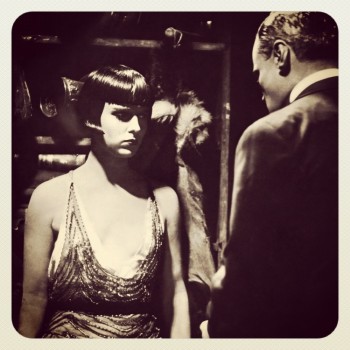Louise Brooks: Doing it Herself
‘In writing the history of a life, I believe absolutely that the reader cannot understand the character and deeds of the subject, unless he is given a basic understanding of the person's sexual loves and hates and conflicts . . .’ Louise Brooks.
Unwilling to bow to the film studio system of the 1920s; independent to a fault; unflinchingly clear-sighted and unsentimental in her analysis of herself and others, Louise Brooks was a most unusual Hollywood starlet, whose tumultuous rise, fall and rise again was as cinematic as her most famous role as Lulu in Pandora's Box.
When she made Pandora's Box in 1928 she had come a long way from her beginnings in Cherryvale Kansas, born to a workaholic father and an unmaternal mother. Her first sexual encounter was when she was nine years old; she was abused by Mr Feathers, an old bachelor. She claimed later in life that the experience had:
‘ . . . forged another link between me and Lulu: when she had her first lover, she was very young and Schigolch, the man in question, was middle aged. I've often wondered what effect Mr Feathers had on my life. He must have had a great deal to do with forming my attitude to sexual pleasure. For me, nice, soft, easy men were never enough – there had to be an element of domination.’
Leaving for New York at 15, Brooks worked first as a dancer, appeared in her first film aged 19, signed a five-year contract with Paramount, and made six more films within a year. The part that changed her career was in A Girl in Every Port (Howard Hawks, 1928) in which she played a circus performer at the heart of a violent sexual triangle. GW Pabst saw it in Berlin and decided he must have Brooks as his Lulu.
However, this nearly didn't happen. Paramount was unwilling to release Brooks from her contract and let her go to Europe, and Pabst almost cast Marlene Dietrich in her stead. But a row over salaries, occasioned by the advent of talking pictures in Hollywood, meant that Brooks abruptly resigned from Paramount and Pabst could have his perfect Lulu. He was relieved. Dietrich lacked innocence, he said; she was ‘too old and too obvious – one sexy look and the picture would become a burlesque’.
In Brooks' assessment, shared by some of the critics of the time, the picture was a flop: ‘That picture, Lulu, was a huge failure. They expected a femme fatale, a siren, a slinking woman with lascivious looks and leers . . . Lulu does nothing. She just dances through the film, she's a young girl, she leads a life she's always liked. She was a whore when she was 12 and she dies a whore when she's 18. How can an audience expect a girl at that age to reflect, to suffer?’.
After two further European films, Brooks returned to Hollywood and a gradual but relentless fall from grace began, partly because of her refusal to sleep with the right studio bosses and a reputation for being ‘difficult’. Her career stalled and her declining fortunes saw her variously act in a radio soap, endure a second failed marriage (her first had ended in 1928), work as a Saks salesgirl and finally become the kept woman of three successive rich men. By 1953, destitution beckoned.
But then, in 1955, something miraculous happened. A major Parisian exhibition featured an enormous picture of Brooks as Lulu and her rehabilitation began. A new career as a film critic blossomed and she became perhaps the most incisive commentator on her own life and myth as one of the iconic figures and faces of the 20th century. In her own words:
‘Most people die before things like that happen – to find that to a certain extent you are admired. It's a wonderful blessing. But I was perfectly willing to face that I'd made my own particular hell. . . . I knew I'd done it all myself.’
You can catch the enigmatic Louise Brooks as Lulu in Pabst's 1929 classic Pandora's Box with a special screening on Friday 2 November at the RNCM, accompanied by a new live score from award-winning Icelandic composer Jóhann Jóhannsson and cellist and composer Hildur Gudnadóttir.
Review of Pandora's Box by Helen Nugent

2 November 2012

